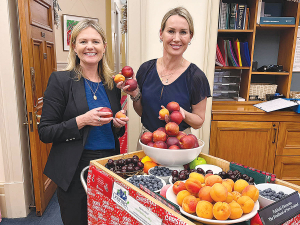NZ Catchment Groups Thrive with ‘Source to Sea’ Approach
The most successful catchment groups in NZ are those that have 'a source to sea' approach.
 Horticulture Minister Nicola Grigg (right) and Tukituki MP Catherine Wedd spreading Christmas cheer around Parliament on behalf of fruit growers last Christmas. Photo: Facebook
Horticulture Minister Nicola Grigg (right) and Tukituki MP Catherine Wedd spreading Christmas cheer around Parliament on behalf of fruit growers last Christmas. Photo: Facebook
Horticulture Minister Nicola Grigg says she takes her hat off to all NZ growers for the hard yards they have put in over the last few years which have resulted in horticulture exports expected to reach the milestone of $8 billion this year.
She says this has happened even though the sector has had to deal with some terrible weather events including Cyclone Gabrielle.
"This 12% growth is absolutely amazing," she says.
The MPI Situation Outlook Report for Primary Industries (SOPI) released just before Christmas showed that kiwifruit exports this year will be worth more than $3.4 billion - up from $2.8 billion a year ago.
At the same time, applea and pear exports will make just over $1 billion. These figures are somewhat astonishing given that so much fruit has been under pressure from the after effects of Gabrielle and other adverse weather events, and in normal circumstances, these figures would likely have been higher.
Grigg points out that to ensure that this growth continues, it is important that parliament gets the regulatory settings right, removes red tape, gets consistent rules right across the country and listens to the grass roots industry.
"My job is to get out to the regions and meet with the various horticulture sector groups and take their feedback to parliament so that my colleagues and other ministers are aware of the needs of the sector I am charged with championing," she says.
Grigg says while each of the sector groups have their own individual issues, in essence they are quite similar to each other.
Labour is a common concern and that is why the Government had made change to the RSE scheme.
Access to water storage are high on the priority list, she says, which is why a review of the National Policy Statement on freshwater is being undertaken.
The other issue she flags is one of access to capital for the sector and points to the inquiry into the banking sector as one means of addressing this.
"My job is to keep advocating for the growth of the sector and, so long as we here in the parliament get it right and the sector has the ambition and fortitude, then the sky is the limit," she says.
Donald Trump's latest tariff tantrum has again thrown the world of trade into a new round of turmoil and uncertainty, and NZ is caught up in it.
The third edition of the NZ Dairy Expo, held in mid-February in Matamata, has shown that the KISS principle (keep it simple stupid) was getting a positive response from exhibitors and visitors alike.
Twenty years ago, South African dairy farm manager Louis Vandenberg was sent to a farm in Waikato to provide training on Afimilk technology.
Strong farmgate milk price is helping boost investment on farms, says PGG Wrightson chief executive Stephen Guerin.
Fonterra's 460 milk suppliers in Australia, who will switch to Lactalis end of this month, are unfazed with the impending change.
The 5+ A Day Charitable Trust has launched a collection of affordable recipes designed to turn everyday vegetables into seasonal stars.

OPINION: A mate of yours truly reckons rural Manawatu families are the latest to suffer under what he calls the…
OPINION: If old Winston Peters thinks building trade relations with new nations, such as India, isn't a necessary investment in…